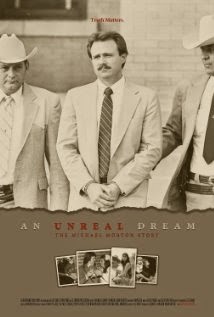An Unreal Dream is a documentary about the wrongful conviction and exoneration of Michael Morton. It debuted in the United States on March 11, 2013. On the morning of August 13, 1986, Michael got out of bed, got dressed, and left for work at the Safeway, just like any ordinary day. He was notified by the Williamson County sheriff Jim Boutwell, that his wife, Christine was deceased, but not until he tried to pick his young son, Eric, up at the daycare center. When questioned about the previous evening, Michael gave a statement that explained that his wife had refused him sex, but he was not upset by her denial. It was his 32nd birthday and he just thought that they would have sex after returning home from celebrating at the City Grill. Autopsy reports came back that determined Christine’s death was caused by eight blows to the head and the time of death was at 1:15 a.m., which was way before Michael left for work. Even though, Michael had denied killing his wife, he was arrested. Michael testified at his trial and, with tears in his eyes, denied the charges of killing his wife. Even with no murder weapon, no proof that he was there, and no scientific evidence, Michael was found guilty of murdering his wife, after a short jury deliberation. A juror on the case Lou Bryan said that there was just not enough evidence to prove that he was innocent. He was transferred to the Wynne Unit in Huntsville Texas Penitentiary, where he would spend the next twenty-five years. He was warned early into his sentence to not go to the day room and not to discuss religion or politics with the other prisoners. He befriended murderer, Richard King, who received innocent vibes from Michael the first day that he met him. The court ordered that Michael’s sister-n-law bring Eric to the prison for visits every six months, but when Eric turned eighteen, he refused to partake in any more visitations. Michael admits that Eric’s decision mentally and physically broke him, but ten days later he found God and nothing else mattered from that point on. In 2002, The Innocence Project took over Michael’s case. Attorney John Raley was handed the case and agreed to do it pro bono. In 2003, it was proven that the time of death could not solely rely on a stomach content analysis, which is what happened in this case. In 2005, they requested a DNA testing of the swabs and a bloody bandanna that was found at the crime scene several yards away from the home by Sheriff Boutwell, but all of this was denied. The new sheriff, John Bradley continued to deny the request so they decided to sue him. His response to their request was only, “testing DNA would only muddy the waters”. Another important document that was kept from Michael’s attorney was Eric’s account of what happened on the day of the murder, which was taken by police chief, Don Woods. He was also not allowed to testify at the trial about any of this data. With all this new information in hand John Raley fought for the right to a DNA analysis on the bandanna, which came back to match the DNA of Mark Allen Norwood. It was also proven that Norwood was responsible for the death of Debra Jan Baker, which occurred two years after Christine’s murder. Michael was released from prison on October 4, 2011. Review An Unreal Dream is not an unusual story by no account because there have been 325 American exonerates since 1989. This is a very common story among these individuals, although each one may vary to some extent. I love these true stories of redemption, but I detest the fact that these wrongly convicted individuals did not get exonerated until many years into their sentences. This documentary is definitely worth watching if you have any interest in how the penal system is so severely flawed. Not one man should be able to hold so much power in their hands as a judge or a district attorney, as in this case. The storyline is paced very well as is the editing done with perfection. I give this film an 8 out of 10. ReelMockeryJay Skelton is a fan of all television shows and movies. He tries his best […]
